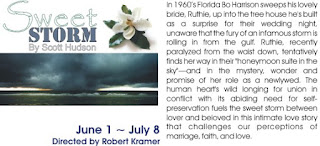Playwright: Scott Hudson
Company: Miner’s Alley Players
Date of Performance: Sunday, June 24, 2012
Running Time: 1 hour, 25 minutes (no intermission).
To describe this play as “intimate” does not really
convey how uncommonly personal it is.
The two actors portray the first 90 minutes of their marriage. They’ve come straight from the ceremony
to the handmade tree house where they will spend their wedding night. What could possibly be more intimate,
more personal, or more private?
For the audience, it is a
privilege to be admitted to such a special moment, but it also seems somewhat
voyeuristic. It’s an unusual
premise, but one ripe with dramatic opportunities. “Sweet Storm” is
not about consummating the marriage, at least not in the usual sense. Rather, it’s a window into a
relationship between two people, and their personal relationships with God.
Bo (Michael Bouchard) is a
preacher, and Ruthie (Rachel Bouchard) is having a justifiable crisis of
faith. It’s awkward at times to
watch them interact; they hardly know each other on their wedding day, and they
barely know how to communicate with each other. They are naïve, innocent, and yet bonded together in a new
and unfamiliar way.
Ruthie asks the question
that Bo has heard many times, and a question all of us have probably asked
ourselves from time to time: “Do you think we’re punished for the bad
things we do?”
It’s a central
question. Does God visit disasters
on us for our transgressions? Do
we suffer because we’ve offended the Creator? If we have faith and lead a virtuous life, why would God
punish us? Or is suffering random,
just a matter of bad luck? Bo’s
faith is strong, Ruthie’s is understandably weak.
Ruthie asks Bo “is luck in the Bible?” Of course, luck is not in the
Bible. Luck is our way of
rationalizing the randomness that intrudes on our lives. But if luck is not the reason for
Ruthie’s predicament, how can it possibly be explained or understood? It is the questions Ruthie asks, and
that Bo can’t answer, that power “Sweet
Storm.”
That the actors here,
Michael and Rachel Bouchard, are actually married to each other adds an
interesting dimension to their performances. They have shared their own intimate wedding night with each
other. They have had those
moments, some of them no doubt awkward, where they began to understand each
other on a very deep, personal level.
And that experience informs their sincere, strong performances.
Putting a tree house on a
stage is a challenge, but Richard Pegg, Scenic Designer, has created a gem that
is both realistic and functional.
The stage lighting includes a working kerosene lantern, which is exactly
what one might find in a tree house.
Lighting and sound are combined effectively throughout the performance
to put the audience in a continuous thunderstorm.
Robert Kramer’s direction
exquisitely portrays the tension, the love, and the struggle the couple faces
on their wedding night. Kramer’s
recent credits include “A Small Fire”
at The Edge Theater, another intimate and powerful production, and one of my
personal favorites of 2012. “Sweet Storm” again demonstrates his
skill for coaxing the most personal emotions from his actors.
Theater sometimes jars us into
thinking about our own lives, and “Sweet
Storm” is one of those thought provoking, rewarding experiences. “Sweet
Storm” may not give you the answers you seek, but it will force you to ask
yourself the questions.
NOTE:
Director:
Robert Kramer
Scenic Designer/Construction:
Richard H. Pegg
Cast:
Rachel Bouchard (“Mrs.
Ruthie Harrison”)
Michael Bouchard (“Mr. Boas
Harrison”)







